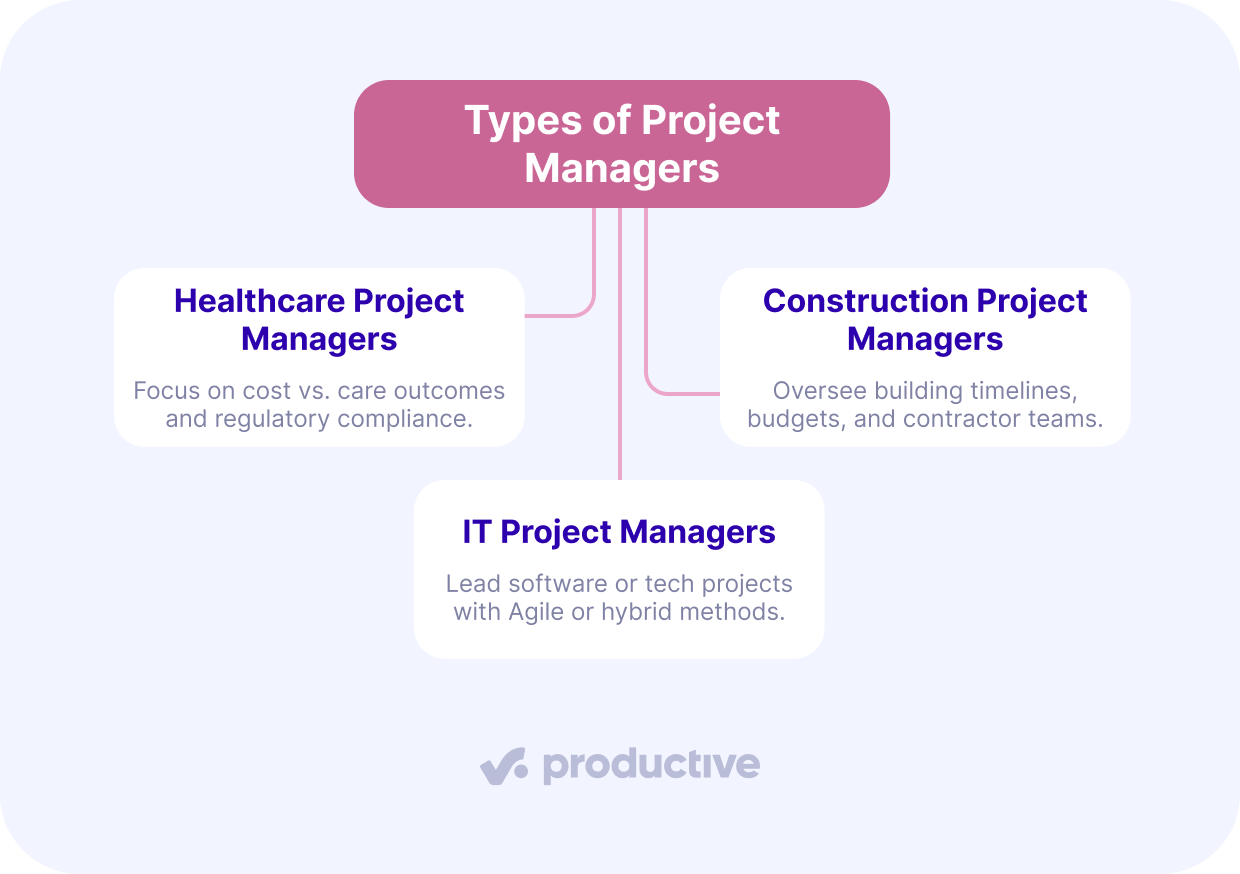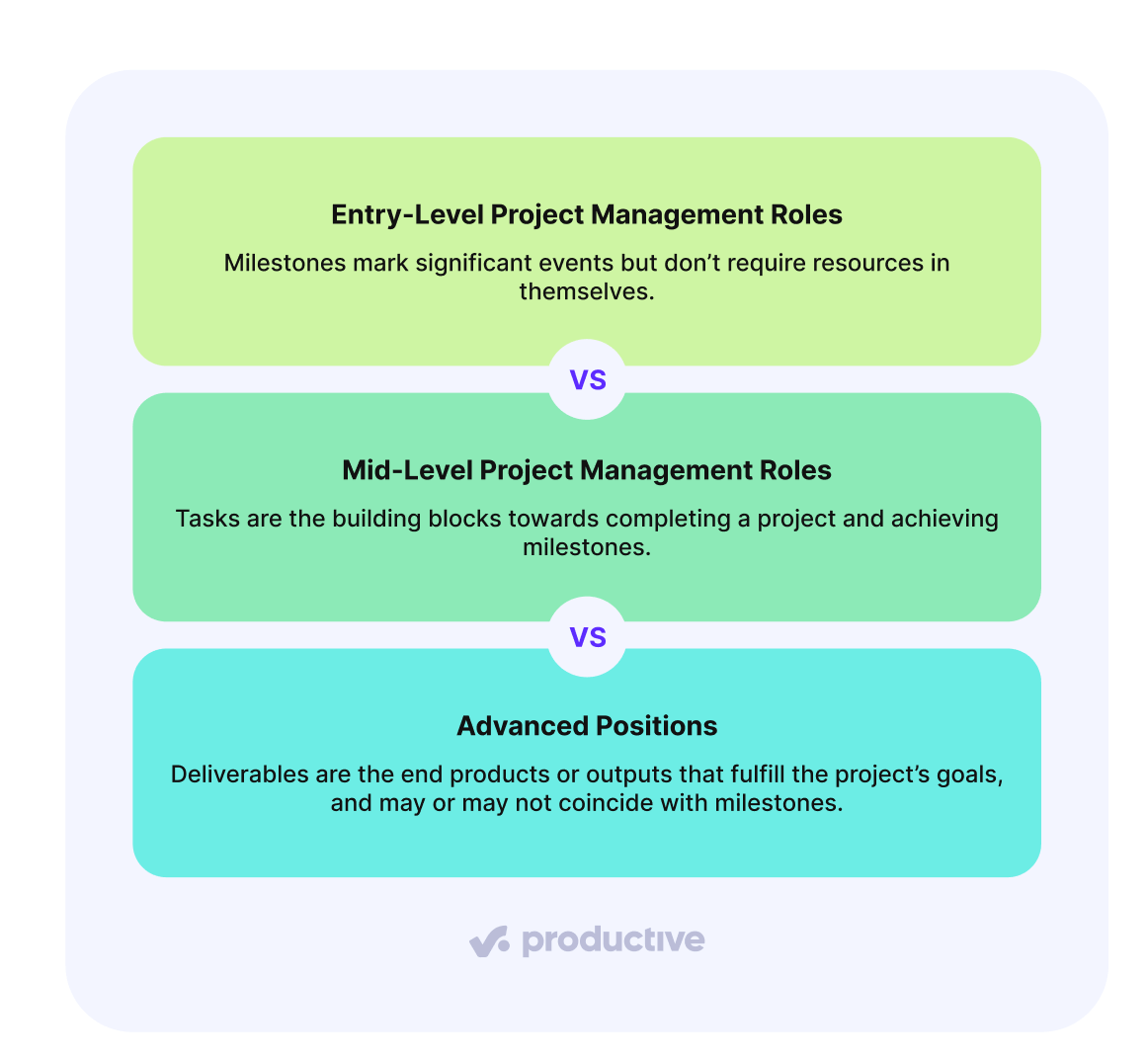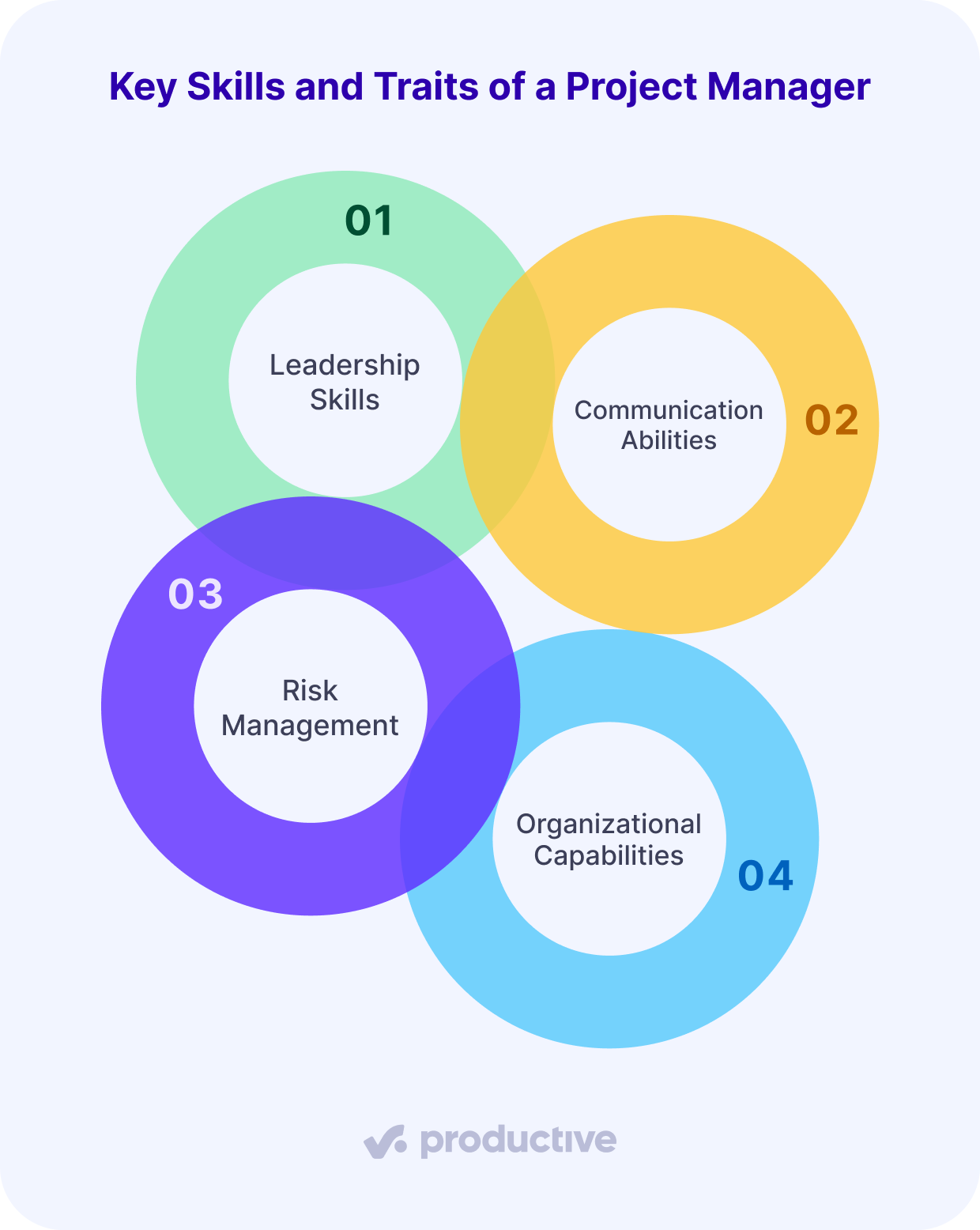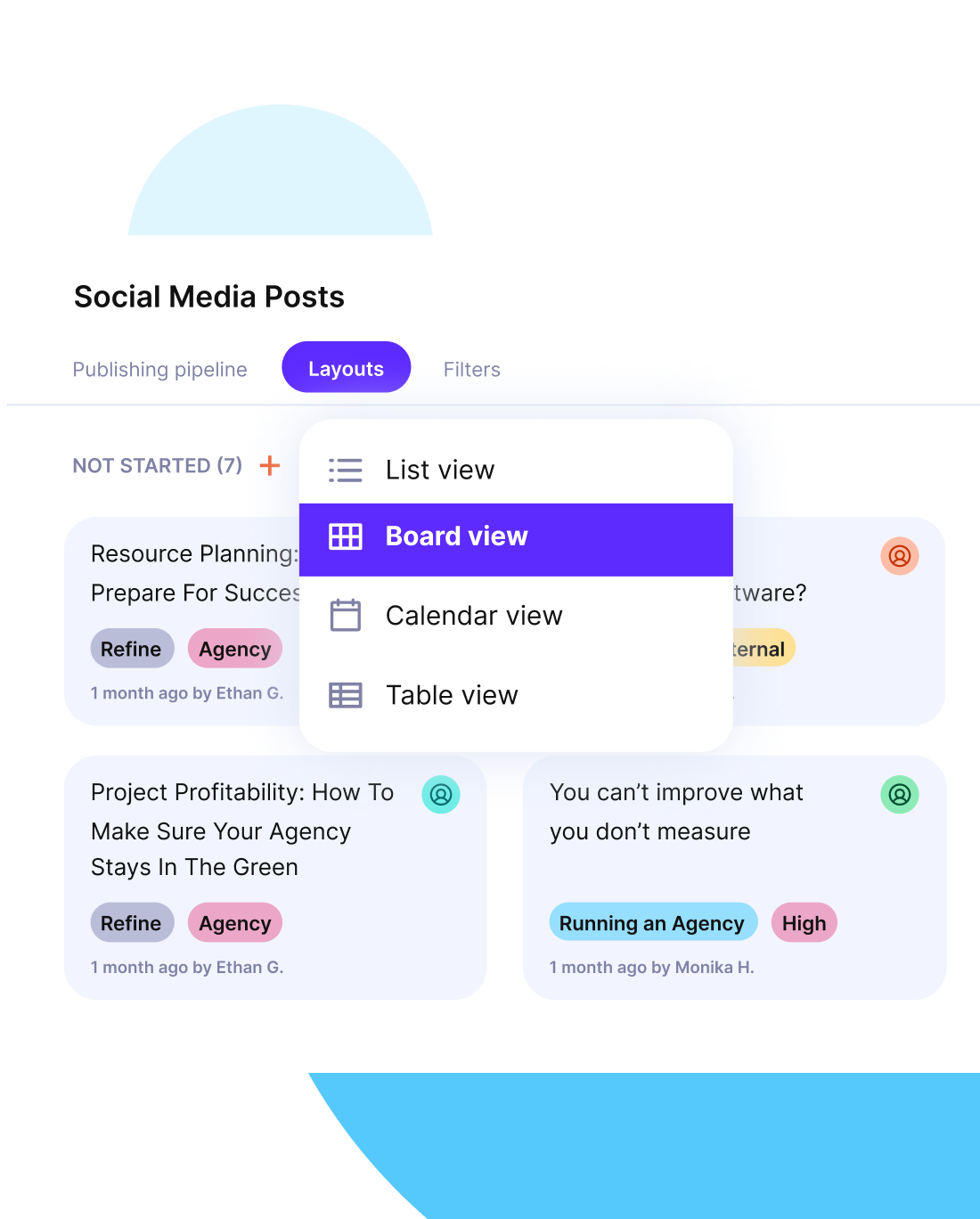How To Become a Project Manager in 2026 – Steps and Education
Project managers turn ideas into real results. It’s a highly sought-after role that attracts many, but figuring out how to start your project management career can feel overwhelming.
By the end of this article, you’ll know how to become a project manager. We’ll also break down key responsibilities, essential skills, industry trends, and tips for advancing your career.
Key Takeaways
- Get relevant education like a bachelor’s degree program in business, management, or a specialized project management certification.
- Gain practical experience by volunteering for project-based tasks or securing internships in your desired industry. These will boost your CV and basic skill set when you apply for an entry level PM job.
- Develop the PM core skills including communication, leadership, problem-solving, and learn how to use modern project management tools.
- Build a professional network using industry associations and seek mentorship from experienced project managers.
How To Become a Project Manager?
You become a project manager by completing formal project management education and earning a bachelor’s degree in business or related fields to specialized PM courses.
Alternatively, you can boost your credibility and job prospects by earning a recognized project management certification such as CAPM for beginners or the prestigious PMP for experienced professionals.
While formal education provides theoretical foundations, you’ll also need to actively develop technical skills in PM software and methodologies alongside essential soft skills like communication, leadership, and conflict resolution to be really good in this managerial role.
Project Management Formal Education
There are tons of project management courses and education options. Your chosen one should align with your career goals, industry preferences, and personal circumstances.
In case you want to properly educate yourself, you should:
- Enroll a specialized undergraduate degree in project management that includes finance, leadership, and human resources disciplines.
- Complement the experience you already have with specialized certificates like the Google Project Management Professional Certificate.
- Never stop learning – leverage continuing education programs that offer flexibility and practical applications.
- Combine formal education with internships or entry-level roles to develop practical knowledge alongside theory.
Professional PM Certifications
Professional certifications are strong credentials that can greatly elevate your career. They validate your expertise and demonstrate your commitment to the profession.
The Project Management Professional (PMP) certification is one of the most highly respected, requiring substantial experience and education. For beginners, the CAPM is a solid entry point that doesn’t cost too much (around $300).
Organizations like PMI, AXELOS, and Google provide various certification options tailored to different career stages and methodologies.
While these exams cost in the range from $225 to $1,000 depending on the certification level and your membership status, the investment typically returns through better career opportunities and income potential.
Project Manager Skill Development
Project managers always need to develop their skillset and combine technical knowledge with strong interpersonal capabilities. You’ll need to cultivate expertise through multiple channels, balancing formal learning with practical application.
Here’s what to keep in mind when developing your skill set:
- Embrace experiential learning by volunteering for projects or seeking internships where you can apply theoretical concepts in real-world scenarios.
- Learn from seasoned professionals and ask them to be your mentors to gain insights into industry-specific challenges and real-world scenarios.
- Develop your communication skills through active practice in team settings.
- Dedicate time to continuous learning by staying current with your industry, its new trends and participating in workshops.
What Is Project Management?
Project management is how you apply knowledge, skills, tools, and techniques to achieve specific objectives within defined constraints of scope, time, and budget.
As a project manager, you’ll oversee the entire project life cycle, from initiation through planning, execution, monitoring, to closure. You’ll also have to balance competing demands and stakeholder expectations.
Your key responsibilities will include defining project scope, creating detailed project plans, building and leading teams, managing risks, maintaining communication channels, managing the project’s resources.
The goal is to ensure that deliverables meet quality standards within the defined deadline.
Definition
As stated by the Project Management Institute (PMI):
Project management is the application of knowledge, skills, tools, and techniques to project activities to meet the project requirements.
You’ll find that project management is fundamentally defined by the triple constraint of time, cost, and quality—balancing these elements is vital for success.
Unlike ongoing operational tasks, projects are temporary endeavors with definite beginnings and endings. Each project aims to deliver specific outcomes that benefit the organization and satisfy stakeholders.
Learning to become a project manager also includes developing effective communication with stakeholders and project teams alike to successfully guide projects from planning to completion.
What Are the Key Responsibilities of Project Managers?
Key responsibilities of project managers are project planning, establishing scope, allocating resources, and creating timelines while anticipating potential risks.
You’ll lead teams by assigning tasks, facilitating collaboration, and resolving conflicts that inevitably arise.
During execution, you’ll oversee implementation, monitor progress, and maintain quality standards. Budget and schedule management requires constant tracking of financial resources and deadlines.
Creating a work breakdown structure will help you organize your project into manageable components for better task management. Finally, you’ll engage stakeholders through consistent communication, managing expectations, and addressing concerns promptly.
Each responsibility interconnects, creating a framework that transforms concepts into tangible outcomes.
Why Pursue a Project Management Career?
If you’re looking for a career with real growth potential, project management is a smart choice. Every project needs to be managed. As a project manager, you’re not limited to one industry — your skills can open doors across tech, healthcare, finance, and more.
Plus, demand is booming: PMI in their 2021 Talent Gap: Ten-Year Employment Trends, Costs, and Global Implications report state that millions of new project management jobs are expected by 2030, meaning strong job security and plenty of opportunities to move up into leadership roles.
On top of that, managers earn higher salaries and have the flexibility to switch industries without losing career momentum. So yeah, project management is important.
Career Growth Potential
Starting on a project management career opens doors to huge career growth opportunities and financial income that few other professions can match. Successful project managers have competitive salaries that often exceed six figures, especially with recognized certificate programs like PMP, which can increase earnings by an average of 33% globally.Your can always use your PM skills in different industries, allowing you to switch between technology, healthcare, construction, and finance throughout your career journey.
Industry Demand for Skilled Project Managers
There’s a good reason behind this this huge demand – employers worldwide face an unprecedented talent gap in this critical field.
With nearly 88 million professionals needed by 2027 and 2.3 million new project manager positions opening annually until 2030, your timing couldn’t be better to enter this profession.
This shortage spans across the mentioned industries, with particularly strong demand in rapidly developing economies like China and India.
As experienced managers retire and organizations increasingly recognize how effective management directly impacts their bottom line. This means that you’re in a good position to make your services more marketable and for the best compensation.
What Are the Types of Project Managers?
The types of project managers are IT, healthcare and construction project management.
The project management field is quite big, it offers specialized roles across various industries, requiring distinct expertise and knowledge sets.
If you’re into technology and software, you might gravitate toward IT project management, where you’ll oversee system implementations and software development lifecycles.
Construction and healthcare project management are different paths, with the first one focusing on building projects and contractor coordination, while the second one requires familiarity with medical regulations and patient-centered initiatives.

IT Project Managers
For this type of project management, you’ll need technical knowledge alongside traditional project management skills to succeed in this role. To become an amazing IT project manager, you should pursue a bachelor’s degree in computer science or MIS, and obtain certifications like CompTIA Project+.
Your career typically begins in entry-level IT positions before advancing to management roles. With salaries ranging from $55,000 to $125,000, this career offers substantial growth opportunities.
You’ll apply methodologies like Agile and Scrum while managing resources, budgets, and stakeholder expectations across diverse industries including healthcare and finance.
Use the same software trusted by top-performing project managers
Construction Project Managers
Building structures from the ground up requires specialized management expertise, which is exactly what construction project managers provide. They use their PM knowledge across residential, commercial, and industrial sectors.
To succeed in this field, you’ll need a bachelor’s degree in construction, engineering, or a related field, plus strong technical and leadership skills.
Key responsibilities include:
- Overseeing the entire project lifecycle from initial project plans to formal closure.
- Collaborating with architects, engineers, and subcontractors.
- Managing budgets and schedules using specialized software.
- Ensuring compliance with quality standards and safety regulations.
Many states require licensure, and certifications like the CPC can enhance your credentials. With employment projected to grow 8% through 2031, it’s a promising career path.
Healthcare Project Managers
Healthcare project managers apply specialized expertise to the complex, patient-centered world of medical facilities and services. They need to push trough strict legal regulations, including HIPAA compliance, while keeping in mind the quality patient care and operational efficiency.
You’ll need strong communication skills to coordinate diverse stakeholders—from physicians to administrators. Your leadership capabilities need to guide multidisciplinary teams. Most positions require a bachelor’s degree in health administration or related field. A PMP or CAPM certification will greatly increase your marketability.
If you end up working in hospitals, clinics, or healthcare agencies, you’ll manage budgets, implement new technologies, and guarantee regulatory compliance.
This branch of project management has growth opportunities, especially as healthcare continues to evolve with technological advancements.
Project Management Career Progression
Your project management career will typically follow a trajectory from entry-level positions like project coordinator or assistant project manager to mid-level opportunities such as project manager and senior project manager.
As time passes, you’ll get more experienced, you’ll also get plenty of opportunities to demonstrate your leadership capabilities. Eventually, doors will open to more advanced positions including director of project management, program manager, or even C-suite project management roles like chief operating officer.
This career path gives you a lot of moving space to specialize in specific industries or methods. You can tailor your progression to align with your professional interests and personal strengths.

Entry-Level Roles
Launching your project management career almost always starts with entry-level positions where you get to build foundational skills while providing valuable hands-on experience. These roles (like the project coordinator, assistant project manager, or project administrator) are your entry ticket toward senior positions (if you work hard enough, stay focused and keep learning).
Common entry-level responsibilities include:
- Supporting senior managers with scheduling, documentation, and meeting coordination.
- Tracking project progress and reporting to stakeholders.
- Assisting with budget monitoring and resource allocation.
- Collaborating with cross-functional teams to guarantee deliverables meet requirements.
While these positions don’t carry full project ownership, they’ll expose you to must-know methodologies like Agile and Waterfall while developing your communication and problem-solving abilities under experienced mentorship.
Mid-Level Opportunities
After establishing yourself in entry-level positions, it’s time to move up to the mid-level. This level-up position is a big step-up in terms of career advancement. It demands both broader responsibility and deeper expertise.
- At this stage, you’ll typically need 5+ years of experience, advanced knowledge of specialized methodologies like Agile and Waterfall, and refined leadership capabilities.
- You’ll oversee complex projects, manage budgets ranging from $65,000 to $120,000 annually, and engage directly with clients.
- Industries including construction, technology, and manufacturing are always on the rise and offer diverse opportunities.
Consider pursuing the renowned PMP certification and developing cross-functional skills to be a more attractive candidate to recruiters. Many positions now offer flexible work arrangements, providing better work-life balance as you progress toward senior roles.
Advanced Positions
As experienced project managers advance their careers, they encounter sophisticated roles that require mastery of complex PM methodologies and exceptional leadership abilities.
These positions demand strategy and organizational influence beyond standard project execution.
- Senior Project Manager – Oversees large-scale initiatives, leads diverse teams, and proactively mitigates risks while mentoring junior colleagues.
- PMO Director – Establishes methodologies, aligns projects with organizational strategy, and works directly with executive leadership.
- Change Management Director – Integrates transformation practices into project execution while maneuvering organizational dynamics.
- Portfolio Manager – Manages collections of projects, optimizes resource allocation, and guarantees alignment with corporate objectives.
Each role requires advanced certifications, extensive project management experience, and refined organizational skills in planning and team leadership.
What Are Essential Project Manager Skills?
Essential project manager skills are hard (e.g., scheduling and budgeting), soft (e.g., communication), and technical skills (e.g., software proficiency and data analysis).
Communication and leadership abilities are essential skills that will help you articulate vision clearly to stakeholders while guiding your team through complex workflows and inevitable challenges.
Your capacity for strategic problem-solving along with technical proficiency in relevant PM methodologies and tools will ultimately determine how successfully you lead projects from conception to completion.
In the sections below we’ll break down that skillset.

Communication
Project managers dedicate approximately 75-90% of their time to communication-related activities. This makes effective communication is a must-have skill required for success.
To sharpen up your approach to communication, you’ll need to certain techniques that bridge cultural barriers and align stakeholders across diverse environments.
1. Master active listening techniques that demonstrate genuine engagement and build trust.
2. Develop clear written communication tailored to different stakeholders’ needs.
3. Implement structured feedback loops to continuously improve team interactions.
4. Use appropriate collaboration tools to maintain consistent information flow.
Better communication means better project outcomes, mitigated risks, and an environment where team members feel comfortable asking questions, making improvement suggestions and sharing concerns.
Leadership
Leadership within project management goes way beyond management skills, it’s how you deliver successful projects consistently.
As a project leader, you’ll need to set a vision of success, motivate your team, and create an healthy environment where collaboration thrives.
You must work on your capacity to adapt your leadership style—whether transformational, adaptive, or servant leadership to fit different situations and team dynamics.
How you resolve conflicts and engage with stakeholders will decide your success.
Beyond organizing tasks, you’ll need to inspire your team to exceed expectations while building lasting relationships that benefit current and future projects.
Problem-Solving and Risk Management
Problem-solving is what a project manager does. It complements your leadership capabilities with the analytical power needed to solve complex business challenges.
When issues happen (and they sooner or later will), you’ll need a structured approach to identify root causes and implement effective solutions that mitigate risks.
Develop these essential problem-solving abilities:
1. Strategic analysis – Master techniques like SWOT analysis and Pareto to prioritize issues based on their impact.
2. Data-driven decision making – Utilize project metrics to inform your resolution strategy.
3. Collaborative resolution – Facilitate team brainstorming to generate diverse solution perspectives.
4. Adaptable implementation – Remain flexible when executing solutions, adjusting as needed based on outcomes.
Technical Proficiency and Organization
A lot of manager make the mistake of focusing only on leadership and interpersonal skills thinking that would carry the day, however, the way you use the tools that get the job done determines how effectively you’ll execute projects.
You’ll need to understand how to best use project management software like Productive, Jira or Microsoft Project, along with data analysis skills to interpret performance metrics.
Familiarize yourself with collaboration platforms, cloud services, and conferencing tools that make remote teamwork possible.
Additionally, develop your technical writing abilities for creating detailed documentation, risk assessments, and stakeholder reports.
Understanding IT infrastructure basics enables smoother communication with technical teams and better system integration planning—essential when implementing cross-departmental initiatives.
Professional PM Career Development Suggestions
To grow as a project manager, you’ll need to invest in networking, connect with industry professionals in person or online (e.g., in blogs, online events or on LinkedIn).
As said, continuous learning guarantees your competitive edge, whether by enrolling in formal certification programs or dedicating time to self-study emerging methods.
Industry conferences, such as the Project Management Institute (PMI) Global Conference or local PMI chapter events are amazing opportunities to learn from thought leaders. Going there is another opportunity to expand your professional network.
Professional PM Career Development Suggestions
Networking is more than just being social and saying hi. Real networking done right provides access to new job opportunities, industry insights, and collaborative possibilities that can push forward your professional trajectory. Using the best digital business card for networking ensures those valuable connections are effortless to maintain and simple to follow up on.
Don’t forget that networking is also a skill that you can cultivate. Here are a few tips to get you started:
- Identify and connect with influential mentors and leaders in your industry (say hi and don’t be shy).
- Regularly participate in both online forums and in-person industry events (get yourself out there).
- Maintain relationships through consistent, genuine and meaningful communication (don’t be fake).
- Share valuable content and insights to establish your professional credibility (give something to get something else in return).
Continuous Learning
There’s a thing called “Learn It, Live It, Review It” framework, which is basically cycling between acquiring knowledge of project management, applying it, and reflecting on outcomes. You need to embrace that.
Develop a personalized learning strategy that combines formal education (certifications like PMP) with informal approaches (industry publications, mentorship relationships).
Set aside dedicated time for professional development, even amid demanding project schedules. The most effective project managers take personal responsibility for their growth, regularly evaluating their skills against emerging industry trends and adapting accordingly.
Industry Conferences
There’s a good reason why top-performing project managers consistently prioritize attending industry conferences. These events are opportunities to stay current with new emerging management approaches while expanding your professional network.
From the PMI Global Summit to specialized events like the Digital PM Summit, these forums accelerate your career trajectory.
Like before, here are some beneficial tips to think about:
- Geographic diversity – Choose from global options including Dubai’s International Forum, Dublin’s Women in Project Management Summit, or Phoenix’s PMI Global Summit
- Specialization opportunities – Target conferences aligned with your niche, whether agile methodologies or PMO strategies
- Certification advancement – Earn PDUs and CDUs to maintain credentials while learning
- Networking potential – Connect with peers and industry leaders during structured sessions
Project Management Career Insights for 2026
As you consider a career in project management, you’ll find that salaries vary widely based on relevant experience, industry, and certification, with PMP-certified professionals often get better compensation.
The job market for skilled project managers remains wide open across sectors, with the U.S. Bureau of Labor Statistics projecting continued growth as organizations increasingly recognize the value of structured project delivery.
Future trends indicate a shift toward hybrid methodologies, increased emphasis on remote team management skills, and greater integration of AI-powered project management tools, making continuous learning essential for remaining competitive in the field.
Average Salary Ranges
Project managers earn an average of $96,372 annually, though compensation varies considerably based on location, industry, and experience level.
- Entry-level positions median salary typically starts between $45,000-$78,700, while experienced professionals can earn up to $270,000 in specialized sectors.
- Managers woking in metropolitan areas like San Francisco and New York earn the most – around $112,850 – $131,821 / per year to compensate higher living costs.
- Technical project managers ($116,460) and senior project managers ($131,210) get extra compensation.
- Certifications like PMP greatly increase your earning potential across all industries.
Current Job Market Outlook and Potential
This impressive salary potential we talked about is here because of the field’s remarkable growth trajectory. The world needs to grow and new tech is developed daily.
By 2030, the global economy will need 25 million new project professionals, with growth rates exceeding 10% across major sectors. Information and publishing lead with 15.2% projected growth, followed closely by finance and insurance at 14.9%.
The biggest industry growth opportunities are in emerging markets like China, South Asia, and Africa, where economic development is accelerating demand.
Meanwhile, developed regions face critical talent gaps due to retiring professionals. This global expansion, coupled with technological advancements, guarantees that earning a project management credential now positions you advantageously for decades to come.
Future Trends in Project Management
Future trends in project management show how traditional boundaries are rapidly dissolving. As you prepare for a career in this field, you’ll need to be aware of several transformative shifts that will redefine how projects are executed.
1. Ecosystem Collaboration – You’ll work within expansive networks of freelancers, AI agents, and strategic partners rather than traditional teams.
2. AI Integration – Expect to leverage AI for routine tasks while focusing your expertise on strategic decisions.
3. Data-Driven Approaches – Your success will depend on utilizing analytics tools that provide real-time insights and predictive capabilities.
4. Methodology Fluidity – Develop proficiency in hybrid frameworks that blend Agile flexibility with structured Waterfall processes.
Final Thoughts
Starting on a project management career requires dedication, continuous learning, and adaptability. You’ll solve complex challenges while developing invaluable leadership skills that transfer across industries.
Whether through formal education, certifications, or experiential learning, your path to success depends on building both technical expertise and interpersonal finesse.
When you consistently refining your skillset and make the best use of professional development opportunities, you’ll position yourself to thrive in this dynamic and rewarding field.
Project managers need the right tools to get the job done. Using modern project management software like Productive makes you job more efficient and successful.
It takes one click to book a short 30-min demo and get started today.
Deliver Projects Smarter With Productive
Productive helps project managers streamline planning, time tracking, budgeting, and reporting—all in one place.

